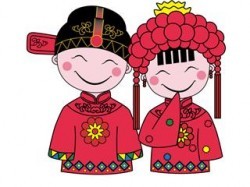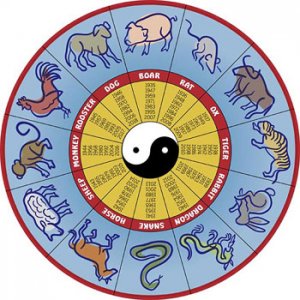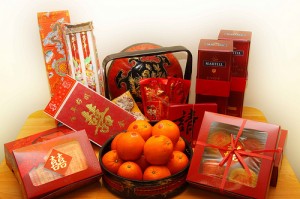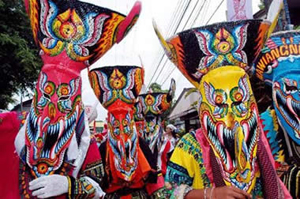Chinese Love – Part Four Posted by sasha on Nov 3, 2011 in Culture, Uncategorized
While Part Three of our Chinese love story was all about sex, the fourth installment of this series is all about marriage. Although the Chinese “Sexual Revolution” is only a few years old, Chinese wedding customs (婚礼习俗 – hūn lǐ xí sú) date back thousands of years. Traditional wedding customs were quite elaborate, and the entire marriage process can be summed up as the three letters and six etiquettes (三书六礼 – sān shū liù lǐ).
The Three Letters
Beginning with the proposal, the man’s family would send a request letter (聘书 – pìn shū) to the woman’s family. Next up was the gift letter (礼书 – lǐ shū), listing the gifts and their value that would be given to the woman’s family. Finally, there was the wedding letter (迎亲书 – yíng qīn shū), which was given to the bride’s family on the wedding day. This symbolized the joining of the two families, and welcomed the bride into the groom’s family.
The Six Etiquettes
First up was the proposal (提亲 – tí qīn). In the past, marriages were arranged between families. Basically, a go-between would run back and forth between the parents of the potential bride and groom, helping both sides decide whether or not the marriage would be a success. Next up was the requesting of birth dates (合对八字 – hé duì bā zì). A fortune teller would compare the woman’s full name and birthday with the man’s. If there were no bad omens about the potential joining of the pair (as told by an astrological expert), the man’s family would proceed to the betrothal gifts (娉礼 – pīng lǐ). Gifts might have included cakes, candies, and two bottles of brandy, along with dragon and phoenix candles (龙凤蜡烛 – lóng fèng là zhú). These were sent along with the request letter, and this stage is somewhat similar to engagement in the West. The woman’s family would accept the gifts and would probably return gifts (回礼 – huí lǐ) to show that the man’s family was too generous, her family was not greedy, and that the two families would share their good fortune together. The woman’s family would replace the bottles of brandy with two bottles of orange syrup, and they would also send back the phoenix candles. On the day of the wedding, the bride’s family would light the dragon candles, and the groom’s family would light the phoenix candles.
If the woman’s family accepted the wedding proposal, the man’s family would send the wedding gifts (过大礼 – guo dà lǐ). Prolific gifts would be given to show respect and kindness towards the woman’s family as well as the capability of providing a good life for her. The next step would be choosing an auspicious date (选择吉祥日子 – xuǎn zé jí xiáng rì zi)) for the wedding. Usually, a fortune teller or a monk would help with the selection of the date. The seventh month of the lunar year would be avoided, as it’s the time of the Ghost Festival (盂兰盆 – yú lán pén), when the gates of Hell are opened and spirits roam the Earth. If you thought Vince Vaughn and Owen Wilson were bad wedding crashers, just imagine a bunch of ghosts running around the ceremony.
Finally, we’ve arrived at the sixth stage – the actual wedding. Are you tired yet? I’m exhausted just writing about all of the work that used to go into a Chinese wedding. Of course, modern era wedding ceremonies can still be quite elaborate, albeit in a different way. In the next post, we’ll compare the traditional wedding customs of China with the more extravagant weddings of today.
(Writer’s Note – I am in no way an expert on ancient Chinese weddings. I did my best to research the topic, though. Keep in mind that China is a huge country with a long history and many different ethnic groups. Obviously, wedding traditions never have bee, nor will be, the same all throughout the country.)

Build vocabulary, practice pronunciation, and more with Transparent Language Online. Available anytime, anywhere, on any device.
About the Author: sasha
Sasha is an English teacher, writer, photographer, and videographer from the great state of Michigan. Upon graduating from Michigan State University, he moved to China and spent 5+ years living, working, studying, and traveling there. He also studied Indonesian Language & Culture in Bali for a year. He and his wife run the travel blog Grateful Gypsies, and they're currently trying the digital nomad lifestyle across Latin America.








Comments:
HUGO LY:
Everything I read is extremely interesting.
Very nice. Iliked a lot.
Thank you
hugo